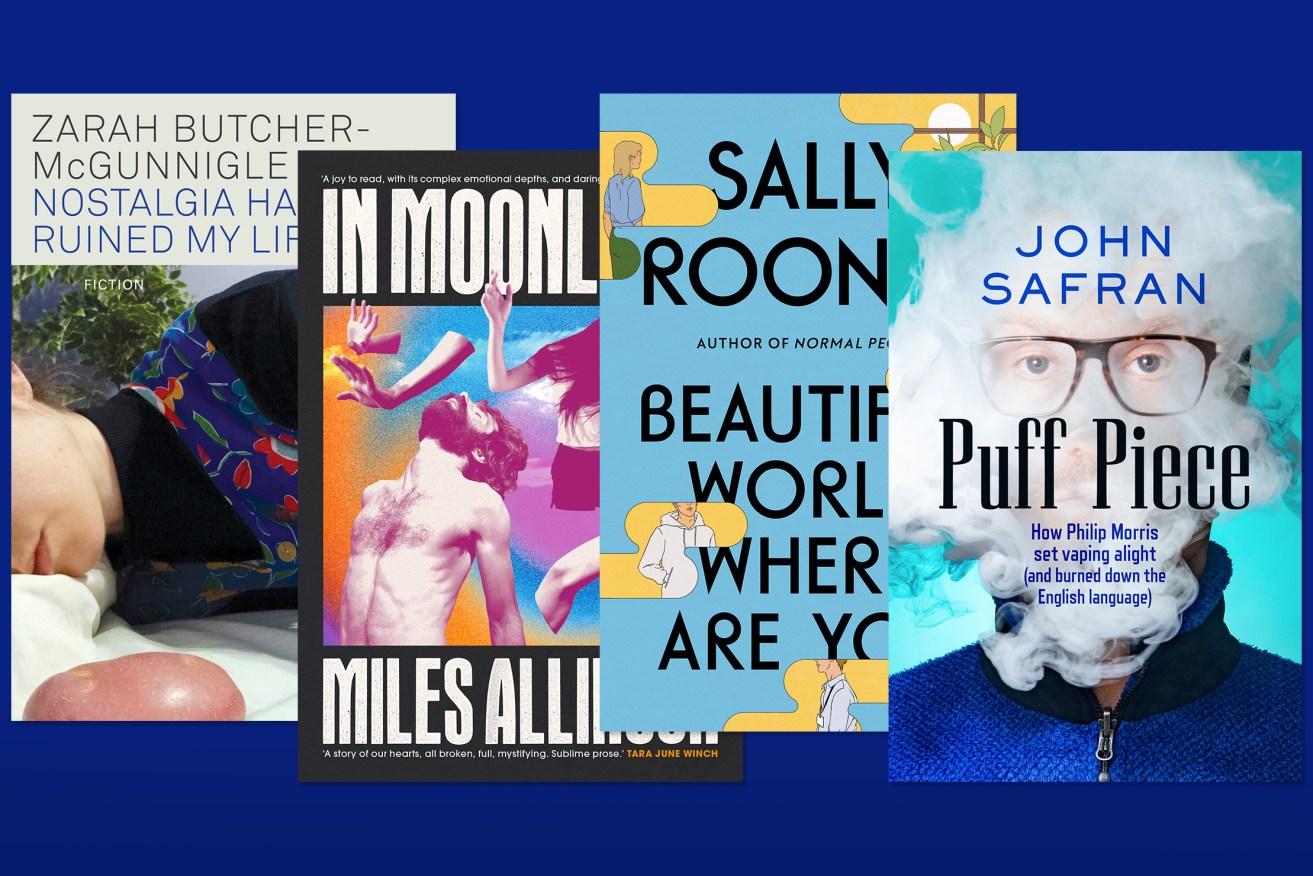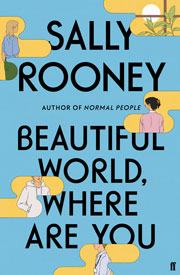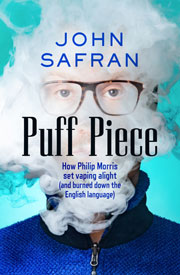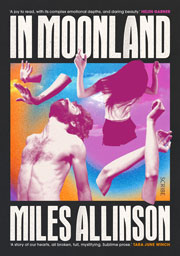Diary of a Bookseller: Smoke and mirrors
Our bookseller dives into John Safran’s eye-opening book about Big Tobacco and the vaping industry, as well as the most-hyped new release of the year – Sally Rooney’s Beautiful World, Where Are You – and two compelling novels from closer to home.


Spring has sprung, and I truly believe nature puts on a world-class show in Adelaide. Sure, we don’t have a monopoly on bursts of golden wattle or bare branches erupting in pink-and-white blooms. But our golden-blue skies are a local specialty.
What does this have to do with books or bookshops? Well, at Imprints, we’ve just done our equivalent of a spring clean – stocktake – in order to clear space for the annual crop of big new books that starts in September. And just like the first big post-winter weekend in the garden, all that crouching and stretching to tend the shelves has wrecked my hibernating muscles. Luckily, while I’ve been recovering with my feet up, I’ve had plenty to read.
The biggest book of all this year, of course, is Sally Rooney’s Beautiful World, Where Are You (Faber), a novel you might have read something about, anywhere from Vogue to The New York Times, to Twitter, where many a bunfight about whether the hype is deserved has been hosted. And here’s where I tell you, as a good bookseller, that it’s available in both paperback and hardback (the latter with a bonus Rooney short story), and for a limited time, you can get the hardback for $27.99 (RRP $34.95).
 Normal People, Rooney’s second novel, was a worldwide phenomenon, spawning an equally popular streaming series. Within the framework of a dry-witted literary rom-com, she forensically mined her characters’ insecurities around class, family and social success or otherwise, while exploring mental health and family dysfunction. Serious ground traversed with a deceptively light touch, the kind that – done well – feels simple.
Normal People, Rooney’s second novel, was a worldwide phenomenon, spawning an equally popular streaming series. Within the framework of a dry-witted literary rom-com, she forensically mined her characters’ insecurities around class, family and social success or otherwise, while exploring mental health and family dysfunction. Serious ground traversed with a deceptively light touch, the kind that – done well – feels simple.
Beautiful World, Where Are You is at once a return to the ground of Rooney’s first two novels – beautiful young people talking intensely and earnestly about love, friendship, the end of the world and Marxism while navigating their attraction to each other and obstacles in its way – and something new. Alice and Eileen, best friends in their early thirties, communicate chiefly via long emails that shift between the personal and luxurious digressions on the state of the world.
Alice, a jaw-droppingly famous novelist who hates her fame, has moved to a small Irish town by the sea (following a mental breakdown), where she meets and dates Felix, a warehouse worker not terribly impressed by her. Eileen, a literary magazine editor back in Dublin, reconnects with her childhood crush and long-time friend Simon, a left-wing Catholic political advisor, but is hesitant to move their authentic connection into a romantic relationship.
In this new novel, Rooney adopts an omniscient third-person narratorial style, standing at a distance from her characters and observing them mostly from the outside, as a stranger might, rather than intensely inhabiting their perspectives as she did in her first two novels. The novel comes most alive in its final third, when the characters come together in the same house, their dynamic crackles and spits, and the dialogue – Rooney’s greatest strength, in my opinion – takes over.
While bookshop conversations are dominated by the Rooney right now – and a very enjoyable opinion-trading is taking the floor – there are other great books to discuss, too.
 One I thoroughly loved, which might appeal to fans of Rooney’s dysfunctional young women, with its black wit and hyper-awareness of material conditions, is a strange little autofictional novel-in-fragments by a young New Zealand writer, Zarah Butcher-McGunnigle, Nostalgia Has Ruined my Life (Giramondo). The narrator is unemployed, bored, depressed and chronically ill, and her dating life is awful. Yet somehow, this book is one of the funniest things I’ve read in a long time. One sample: “My father is getting remarried … He asks me what I’ve been up to recently and I say nothing because I am very depressed and anxious. He says, ‘Oh right, well, I am thinking about getting the house renovated because there’s no flow’.”
One I thoroughly loved, which might appeal to fans of Rooney’s dysfunctional young women, with its black wit and hyper-awareness of material conditions, is a strange little autofictional novel-in-fragments by a young New Zealand writer, Zarah Butcher-McGunnigle, Nostalgia Has Ruined my Life (Giramondo). The narrator is unemployed, bored, depressed and chronically ill, and her dating life is awful. Yet somehow, this book is one of the funniest things I’ve read in a long time. One sample: “My father is getting remarried … He asks me what I’ve been up to recently and I say nothing because I am very depressed and anxious. He says, ‘Oh right, well, I am thinking about getting the house renovated because there’s no flow’.”
During stocktake, I briefly followed a colleague around the shop, reading him excerpts aloud. (Sorry, Ben.) In bed that night, armed with chamomile tea, I read parts aloud to my husband, who chuckled uncertainly and said, “That’s really weird.” Casually horrifying, delivered in a self-aware deadpan, this book won’t be for everyone, but I highly recommend it nonetheless. To me, this is humour as both coping mechanism and awareness-raising, masterfully employed. I will read whatever this author writes next.
Another weird, excellent book I have been inflicting on my husband in sections, because it begs to be talked about, is Puff Piece: How Philip Morris set vaping alight (and burned down the English Language) by John Safran (Penguin). Safran, who first came to fame as a documentary maker, is often compared to Louis Theroux and Jon Ronson – including by me. I’ve heard him talk publicly, with Ronson, about that comparison, and all three men acknowledge the echoes of their shared interest in investigating weird worlds and conspiracies, real and imagined, using dry observational humour, dogged persistence and themselves as unthreatening (and thus disarming) interviewers.
 Ronson, one of my favourite writers, is actually the closest comparison on the page. Both writers structure their books around a mix of discovery – the central thrust – and comic digressions that often turn out to be more meaningful than they appear, pushing the story forward or adding an alternative perspective. In Safran’s case, those digressions often feature iconic social-justice campaigner priest Father Bob, or his local rabbi.
Ronson, one of my favourite writers, is actually the closest comparison on the page. Both writers structure their books around a mix of discovery – the central thrust – and comic digressions that often turn out to be more meaningful than they appear, pushing the story forward or adding an alternative perspective. In Safran’s case, those digressions often feature iconic social-justice campaigner priest Father Bob, or his local rabbi.
In Puff Piece, Safran sets out to investigate how Philip Morris continues to navigate and evade the regulation of cigarettes, with behind-the-scenes manoeuvring, lobbying, shell companies and organisations, and wickedly masterful Orwellian language twists. Did you know that Philip Morris is a major player in the e-cigarette market? But unlike vaping (which has its own controversies), the company’s IQOS is loaded with HeatSticks, small cylinder objects packed with tobacco and nicotine that look exactly like cigarettes. And, like cigarettes, produce tar. Which is the main cause of lung cancer. Yet with this product, Philip Morris is now vigorously rebranding itself as anti-smoking (HeatSticks don’t produce smoke, they produce vapour).
This is a truly eye-opening look at the industry, the parallel universe of vaping (and how they are connected through lobbying), and – one of Safran’s central concerns – how the general public has been distracted from caring very much. Safran is furious at the way “the new moral code” means the zeitgeist cares more about identity-based language than the way corporations are using language to evade regulations designed to stop them from poisoning us. And while I didn’t always agree with his specific arguments in this thread, I do think the broader point is worth exploring. Maybe because, like Safran, I came of age as a Gen-X acolyte of Naomi Klein’s No Logo – yet now, not only do I own three pairs of Nike sneakers, but have a tendency to shrug that all big corporations are awful, rather than consider how we might demand change. I appreciate being forced to pay attention.
 Another new book that draws on the idealism of past generations is In Moonland (Scribe), the stunning second novel from Melbourne author Miles Allinson, whose 2015 debut Fever of Animals won or was shortlisted for several awards. A novel in parts, traversing three generations and multiple viewpoints, In Moonland is a meditation on family, emotional inheritance, memory and belief. It’s also about the power of the stories we tell ourselves about who we are and where we come from: how, rather than reflecting an objective truth, they can shape, trap and free us. And while its ideas and structure are complex, Allinson’s prose reads with the ease of a knife through warm butter, at times echoing the crisp, wry vulnerability of Helen Garner, who calls this book “a joy to read”.
Another new book that draws on the idealism of past generations is In Moonland (Scribe), the stunning second novel from Melbourne author Miles Allinson, whose 2015 debut Fever of Animals won or was shortlisted for several awards. A novel in parts, traversing three generations and multiple viewpoints, In Moonland is a meditation on family, emotional inheritance, memory and belief. It’s also about the power of the stories we tell ourselves about who we are and where we come from: how, rather than reflecting an objective truth, they can shape, trap and free us. And while its ideas and structure are complex, Allinson’s prose reads with the ease of a knife through warm butter, at times echoing the crisp, wry vulnerability of Helen Garner, who calls this book “a joy to read”.
Joe, mired in early fatherhood, becomes obsessed with finding the truth of his charismatic, episodically violent, yet loving father Vincent’s life and death (the latter either suicide or a dramatically reckless accident) – while increasingly alienating his wife and young daughter. In the late 1970s, in the months before he met Joe’s mother, Vincent was changed forever by an intense, troubling experience in India as a member of a cult (a real-life cult, led by Bhagwan Shree Rajneesh), where members were urged to unleash the “total self”, no matter what that might be. And in a near-future of environmental collapse and continued technological advancement, where hope and idealism are in short supply, we meet Joe’s daughter Sylvie, now adult.
The mosaic of interacting stories and time frames works beautifully, in a way that will reward (but doesn’t require) re-reading, to further trace the connections and contradictions. It’s also a complex, nuanced and fascinating exploration of masculinity, through fathers and sons, and tender male friendships.
While Allinson’s narrators are cynical and disillusioned, the novel is compassionate, cherishing the flawed humanity of its characters. As Vincent, the figure who looms largest over the novel, approaches the cult, his thoughts “swirled in a general feeling of inadequacy and rage that trailed him everywhere. It was as if he were loitering at the edge of his own life, waiting for the real thing to begin. So maybe this was it, he’d thought, this ashram. The real thing.”
Jo Case is a bookseller at Imprints Booksellers on Hindley Street and an associate publisher at Wakefield Press.




